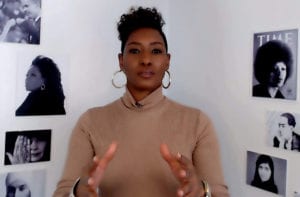Who is a member?
Our members are the local governments of Massachusetts and their elected and appointed leadership.

Risha Grant addresses local leaders during the virtual MMA Annual Meeting & Trade Show on Jan. 22.
When motivational speaker and diversity consultant Risha Grant describes the importance of inclusion, the former college basketball player talks about how much she hated the sport as a young girl.
During her Jan. 22 keynote at the MMA’s 42nd Annual Meeting & Trade Show, Grant said her cousins made her watch them play basketball, but wouldn’t let her participate. After an older cousin taught her how to play and championed her, she fell in love with the game, and eventually received several Division 1 scholarship offers. If you “want to make a difference in someone’s life,” she said, you must be inclusive.
“So you have to ask yourself, who is it that you can be an ally for in the office?” Grant said. “Why is that person not talking? How can you amplify their voice? How can you make sure that they are truly a part of the team? That’s inclusion.”
Grant is the founder and CEO of Risha Grant LLC, a diversity consulting and communications firm in Oklahoma, and a radio host, newspaper columnist and author of “That’s BS! How Bias Synapse Disrupts Inclusive Cultures and the Power to Attract Diverse Markets.”
In an interactive session called “Get Rid of the BS (Bias Synapse),” Grant helped participants discover and examine their biases, and gave them tools for changing behaviors. She coined the term “bias synapse” to describe the way our brains process bias, as if on autopilot.
We must address diversity, inclusion and bias, she said, because it’s the right thing to do. By 2042, the United States will be a minority-majority country, she said, and five states have already crossed that threshold.
“As cool as diversity is, let’s be real: A lot of people find it extremely challenging,” she said. “The world finds it extremely challenging. And challenging is putting that in nice terms, right? Because if I were to put it in real terms, I would say that Black people are being killed at the hands of those who are supposed to protect. The words ‘Black man’ have been weaponized, and we know that racial disparities exist in every area of our world.”
To create change, people need to identify, own and confront their unconscious biases. Using electronic polling, Grant asked attendees about their self-identifications, their biases, and positive actions they could take.
She cautioned against putting people in categorical boxes, giving an example of a man that she prejudged because he had “666” tattooed on his forehead. After talking to him, she realized that the tattoo wasn’t a satanic reference, and that he was a reformed convict who had helped lead hundreds of people out of gangs.
“People don’t fit in boxes,” she said. “They are going to get out every time.”
Through her concept of a BS Finder, Grant calls on people to assess their reactions; attribute the causes; and identify whether their feelings are based on personal experiences, social norms, or deeply-rooted beliefs.
Families often pass down hurts and fears through generations, Grant said. When she was young, her grandmother repeatedly warned about how “they” might treat her as a Black girl in a mostly white community. One summer, her grandmother made her study because “they” might not give her an equal education. She would also insist that Grant get receipts with her penny candy, to guard against theft accusations.
“She was trying to teach me how to navigate in a world that wasn’t made for me,” Grant said. “So it taught me unconscious bias, it taught me mistrust, but it also taught me how to navigate in this world.”
While Grant appreciated her grandmother’s protectiveness, she eventually had to address the mistrust it created.
To confront bias, she said, we need to build authentic relationships, be intentional about actions, question assumptions, and challenge microaggressions.
Grant recalled talking to a white man once in a Chicago bar. Their pleasant conversation derailed when the man called Grant “such a credit” to her race, and repeated bigoted stereotypes. Instead of berating him, she explained why his words hurt. In return, she got an apology, a “big steak dinner,” and a new friend.
“Challenge those microaggressions, but do so with grace,” she said.
To build more diverse workplaces, Grant suggested that leaders review resumes without any identifying information, select diverse interviewing panels, ensure that questions don’t just reflect interviewers’ backgrounds; reconsider prioritizing graduates of the “best schools”; and consult websites or consultants for inclusive hiring advice.
To improve environments for employees, organizations need policies for inclusivity, zero tolerance and anti-retaliation.
In response to a question, Grant spoke to a woman who is the only person of color on her board and feels isolated for voicing inclusivity concerns. Grant suggested that she ask a sympathetic colleague to back her publicly, so she isn’t advocating alone.
“You’ve got to kind of grab your allies, and shake them awake,” Grant said. “And say, ‘You know what, I know that you may be concerned about how this is going to come off, but what’s right is right.’”
Arlington Town Manager Adam Chapdelaine, who relayed members’ questions, said he wants to promote best practices for equity and inclusion as the MMA’s president in 2021.
“We have to be brave, and we have to be courageous, and we have to understand that it’s very likely that we are going to misstep,” he said. “But we have to engage in this work, and we have to be allies. We have to be accomplices, and we have to be upstanders so that we can really start to address the BS that we all know that we have, and the people in our organizations and communities have.”